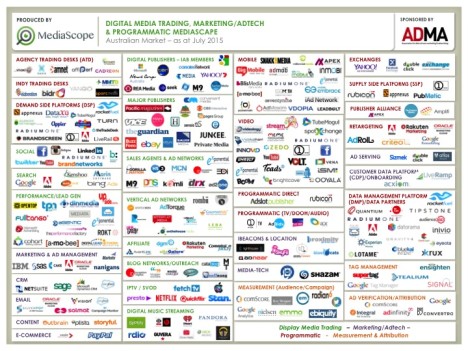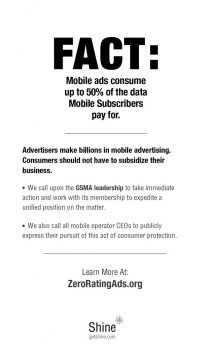Marketers ‘need to cut out middle men and ask tough questions to clean up programmatic’
The ad tech industry will undergo a “clean up year” in 2016 with more clients cutting out the middle men and taking services in house, according to Ooyala’s global head of ad tech.
Sorosh Tavokoli told Mumbrella marketers need to start pushing their agencies on the amount they are paing to publishers if the industry is to become more transparent.
“I think it’s very clear the brands need to take control,” he said. “They need to ask the tough questions, put their finger where it really hurts and push and push and pour some salt.
“They are effectively the ones losing out, are they happy to put their money with advisors they don’t understand? There’s a lot of don’t ask don’t tell going on, not from the person who’s looking for the ROI but all the levels in between.”
He added: “Programmatic was supposed to be transparent, efficient and effective and it’s almost been abused to a point where the middle men have been the best at using programmatic to sustain their businesses, make more margin and being even less transparent than before.
“I think that is changing and buyers are getting clued up and asking questions about what they bought and why they aren’t being told what they paid for it.”
Tavokoli was a founder of startup programmatic video ad platform Videoplaza, which was bought by Ooyala 20 days after it was acquired by Telstra last year. He was visiting Sydney to talk to publishers about taking up its full-service video player and programmatic ad platform.
He said he thought 2016 would see a consolidation in the market with fewer vendors as publishers look to cut the number of outside companies they have to deal with.
“That’s one of the reasons we joined forces with Ooyala and Telstra,” he said. “As any technology market matures there will be fewer players, fewer point solutions and increasingly broader solutions that are maintained.
“I think publishers are fed up with picking vendors, cutting a deal and start integrating and by the time you’ve done that you’ve got another vendor coming in, or they’ve been acquired, or they’re living dead where they can’t really afford innovating. It’s extremely expensive for these publishers to constantly be in that mode.”
Tavokoli added that while the market was evolving there would be more specialist vendors popping up with niche solutions, but over time publishers would settle on one or two suppliers for different aspects of their business.
Asked about the challenge posed by the rise in usage of ad blockers Tavokoli pointed to technologies, including Ooyala’s own solution, to circumvent it, saying they gave publishers a unique audience to sell to.
Citing a figure of 18 per cent of online Australians now using ad blockers he pointed to “two levels of awesomeness”.
“Number one these are definitely people, it’s almost certainly not a robot. The second one is you’re delivering to people who almost certainly aren’t getting advertising anywhere else, so these people are living in a world where they’re not seeing many ads – at least on their desktop, so if you’re able to show an ad to them you’re likely to have higher impact and increased reach.
“Sometimes people view ad blockers as militant privacy and ad haters, I think that’s a very small minority of people. I think the majority see it as a cool plug-in which makes the web faster, and they don’t really know it’s on or really what it was.”
Asked what trends he was seeing in the online video market he pointed towards a trend of charging more for the first ad in a break as marketers are used to that dynamic with TV.
However he warned while many publishers were trying to move towards programmatic trading they were struggling to find a way to get their sales teams to push it.
But he said globally there was evidence there was a shift: “We’ve definitely seen examples where publishers are comping their sales people based on brands, where they say it doesn’t matter how they buy from us you’ll still get your commission.
“Then you go to Procter & Gamble and say sign this, but if you don’t want to you can buy it through this programmatic channel.
“That’s driving the right kind of behaviour where you have people working together rather than agains each other. That’s one of the challenges as business transform is really the comp model.”
Looking at next year Tavokoli said he believed the transparency issues would see more brands taking their programmatic offering in house.
“A lot of the big brands are taking their destiny in their own hands and building their own data houses outside of agencies and saying our data is ours, were going to manage it, now agency here’s our data go and buy in these ways for us,” he said.
“If you’re not doing a good job we’ll go somewhere else, we’re keeping our data.
“Some of those tough conversations need to happen – there will be some margin issues on the agency side and this will put pressure on the agencies, but they have to clean up their act if they’re to continue to have the trust of the brands.”
Alex Hayes







Man with vested interest in advertisers cutting out the middlemen advocates for advertisers to cut out the middlemen.
User ID not verified.
Hilarious. Like clients haven’t got enough to do. Despite the fact It would be prohibitively expensive for clients to bring these services in house, how do they expect to recruit, train and retain the best talent. Clients don’t have a clue about this space and the big agency networks do, and play a straight bat. SOX makes sure this happens. The people running the programmatic marketplace want scale to work with, not one clients budget. Good luck going it alone.
User ID not verified.
“…and play a straight bat”
..now that’s hilarious!
User ID not verified.